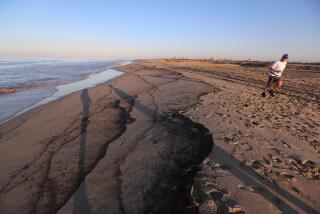Oil Vessel Has Been Involved in 4 Accidents : Shipping: American Trading is a reputable firm, industry sources say, but its fleet is ranked below average by a ship-rating agency.
- Share via
New York-based American Trading Transportation Co. Inc., owner of the vessel that spilled 300,000 gallons of oil off Huntington Beach, rarely finds itself in the public eye.
Founded in 1972, the six-ship firm is typical of the small, independent companies whose vessels supplement the fleets of large oil companies.
The shipping unit is a subsidiary of American Trading & Production Corp., a diversified, privately held company based in Baltimore that has annual revenue of about $400 million.
While industry sources said American Trading is a sound and reputable firm, it has also had its share of problems.
The company’s fleet has been involved in numerous accidents--though no previous oil spills--and is rated below average by a ship rating agency.
American Trading’s six ships have had 41 reported incidents since they have been in service, according to Arthur McKenzie of the Tanker Advisory Service in New York, although none involved spills.
The firm’s ships range in age from 7 to 35 years.
The American Trader, a 21-year-old vessel involved in the oil spill Wednesday night, was purchased last July from Sun Oil Co. of Radnor, Pa.
The tanker has been involved in four accidents, with two occurring within the past year.
In December, the American Trader collided with a Texaco tanker in San Francisco Bay, although there was no damage, and also suffered a collision in Bangladesh in April. And in 1986 the ship collided with the tanker HJ Haynes in Long Beach, causing $239,000 in damage to the two vessels.
McKenzie rates the American Trader at 3 on his 1-to-5 tanker rating scale, which takes into account the age, owner and accident record of a ship, among other things.
The six-ship fleet as a whole gets a 2.3 rating, which McKenzie called below average. Although three of American Trading’s ships were built on order for the firm in the early 1980s, the other two--the 34,000-metric-ton Pennsylvania Trader and the 58,000-ton Baltimore Trader--are 28 and 35 years old respectively.
The 82,030-metric-ton American Trader is the largest ship in the company’s fleet and belongs to what the industry calls the “Panamax” class of tankers--the largest tankers that will fit through the Panama Canal. It was built at the now-defunct Sun shipyard in Chester, Pa., and would cost an estimated $100 million to $120 million if it were built today, an industry source said.
American Trading President Sanford V. Schmidt said the company has been in business for about 50 years and hauled grain in its tankers as well as oil. But he declined to provide financial details about the company.
A spokesman for the American Petroleum Institute in Washington said Schmidt had taken an active role in industry affairs and that the firm had a good reputation.
“This is a very well-run company, with good equipment and good people,” said Jerry Aspland, president of Arco Marine Inc. in Long Beach, the shipping subsidiary of Arco, which has used American Trading’s services in the past.
With six ships, American Trading is about average in size for an independent U.S.-flag tanker company. Although most of the major oil companies try to carry most of their own oil, nearly all have at least occasional need for independent tankers that can be leased. Such leases can be either “bare boat,” in which the oil company provides the crew, but in most cases--including that of the American Trader--the shipowner provides the crew.
Independent shippers are helped by a U.S. law which prohibits foreign-flag ships from hauling oil between two U.S. ports. That means that British Petroleum and other foreign firms can’t use their own ships and are forced to rely on the independents for many missions, such as carrying oil from Alaska to Southern California.
Thomas Moore, vice president for operations at Chevron Shipping, said he was not familiar with American Trading, but noted that independent operators sometimes had less incentive to run their ships well.
“Our ships run better than those we charter in,” he said, although he conceded that some of the biggest oil spills, such as the Exxon Valdez, were from company-owned tankers.
More to Read
Sign up for Essential California
The most important California stories and recommendations in your inbox every morning.
You may occasionally receive promotional content from the Los Angeles Times.













